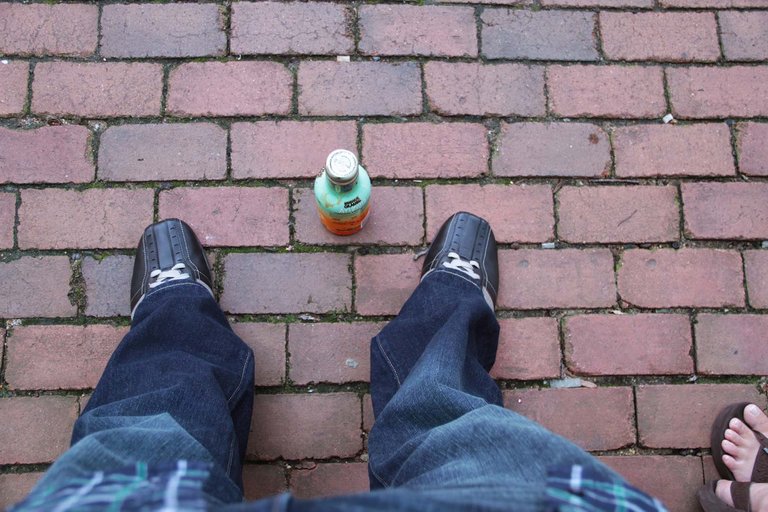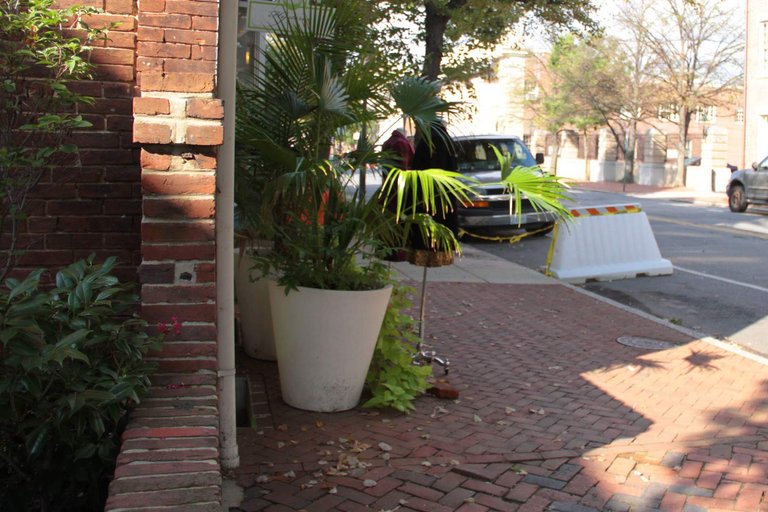This is my first post using the #MundaneMadness tag created by fellow Steemian, @robertandrew. I'm surprised that it took me this long to do it considering that everything that I ponder on in any given day is quite mundane. There is plenty of material rocking around in my brain to work from!
When I was growing up my father was in the military so we were always moving around. Sometimes we'd be in the country and other times we'd end up in the city. I remember the first time that I encountered brick roads was in my hometown of Dayton, Ohio where I lived while dad was deployed for a while. There is an old area of town where the roads were still made of brick and boy were they bumpy! I imaging that they still are, but I haven't been back home for some time.
Back then I kind of disliked those old roads yet I had an appreciation for them.

When horse drawn carts started to really pack the streets and automobiles began to emerge, it became clear that plain old dirt paths and gravel were no longer cutting it.
Bricks had already existed for hundreds of years, and were a very common building material by the late 1800s so they were readily available to solve the ever increasing problem. A man by the name of Mordecai Levi (Wow, what a badass name) was responsible for coming up with this new method of building roads here in the United States.
His first project was an experiment. With financial help, he paved a section of road on Summers Street in Charleston, West Virginia. I was paved completely with bricks, making it the first brick road in the United States. The benefits of using bricks instead of dirt and gravel became quite apparent very quickly. In those days, after a storm the roads would become completely unusable as the water would wash away the rocks and leave huge muddy holes that were quite dangerous to travel across.
By 1873, Levi had managed to pave an entire city block with bricks. It didn't take long for it to became the stardard way of paving roads pretty much everywhere. This method revolutionized roads and really helped to solve many of the heavy traffic problems of the time. It's kind of comical to imagine all the horses and old Fords racing around each other at 10 MPH screaming and pumping their fists at each other.
The process of how the roads were to be built was actually patented by ol' Mordecai himself. First, the ground would be prepared by grading it or filling it in as necessary. Then a layer of sand, stone, slate or gravel would be added on top. After that, a second layer of material such as asphalt or similar was added. Lastly , a final layer of sand would be added followed by the bricks. Generally the center of the road would be slightly raised, presumably for drainage purposes.
The one thing that I found fascinating and unexpected about brick roads is that apparently they hold up better than asphalt roads. To illustrate this, asphalt paved roads must be replaced more or less every 15 years, while bricks often last more than 100 years.

So next time you get annoyed riding down a bumpy brick road, remember how much less a tax burden that road is compared to it's smoother counterpart!
I think bricks are cheap in price. We still have roads here with bricks. And those Bricks are simply beautiful and admirable.
It's a great way to build roads with brick. It cost less than any other material.
Thanks @nuthman for sharing with us
You are right Brick road are far better than normal reads. Brick roads are long lasting.
I am from India & we do have brick roads where usually heavy vehicles move and percentage of dust is more.
On brick road dust settles down easily.
And thanks for this article and pictures.
Please do post many more of you adventures and ideas.
Thanks.Hi @nuthman
Thanks for reading, @nasarakbar. Brick is also more cost effective in the long run, which is helpful in a country as large as India with a massive population!
Rightly said.
Considering our population which is world's second highest.
These roads are good for our economy.
Interesting. This is to say that Levi paved way for the building of modern road and I think huge honor should be given to him. He saw the future, he believed in it and he took action to make sure they were fulfilled.
BTC, I would love to know the feature of this mundane you are using to browse.
Just click the link I posted on the reply to @mango-juice above. You can read about the tag there! I agree, Levi had a great idea and then implemented it. We need more people like him in the world today.
Wow! Cool pictures mate. Mr. Levi did a quite unique work back there to rescue the roads from the natural calamities. We also have several brick roads in our local area which are now being renovated to concrete roads . Yes, they are quite bumpy bt stay longer than the usual stone and clay roads. In tropical countries like india... It Rains a lot and the roads become pathetic to walk or drive on. But as bricks are stronger and of long life span. They were used to make the roads more stable and durable. by the way i wanna know about that #mundanemadness tag ... What it does? And also keen about @robertandrew and his project. Stay well mate and keep posting. Steem on!
Posted using Partiko Android
Hiya, @mango-juice! The tag is just to get peoples' creative juices flowing and to get people coming up with interesting ideas that aren't often elaborated on. You can read about it and the rules here: https://steemit.com/mundanemadness/@robertandrew/mundanemadness-the-ever-extraordinary-vacuum-cleaner
Reading in... Thanks for the link... 😋
Posted using Partiko Android
Very interesting information!
I wonder why bricks are in less use for road constructions these days when they know it last longer and seldomly needs repair.
Probably because they arent as smooth. That would be my guess!
Your post was mentioned in the Steemit Hit Parade in the following category:Congratulations @nuthman!
las construcciones antiguas son lo mejor lo hacían realmente para durar últimamente todo es de plástico y no duradero es una lastima
Nice blog and pic sir
Posted using Partiko Android